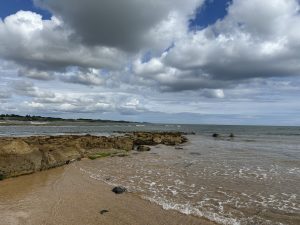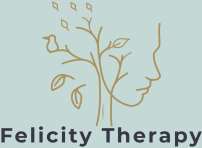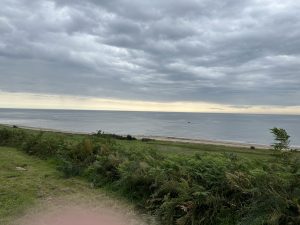This is a topic I’ve wanted to write about for some time but it’s also one that hurts me most to ponder so I’ve been putting it off.
 A recent family holiday visiting the magnificent beaches of the Northumberland coastline got me thinking about something I’d started writing following my mum’s death in 2020 and completed following the death of my dad in 2022. It starts with the line, ‘Grief is an ocean of unpredictable tides,’ and while I stood on the shore of the North Sea and marvelled at the accuracy of tidal calendars and shipping forecasts, I was reminded of the inaccuracy of my predictions about my grief. I couldn’t predict its ebb and flow, its high tide, its strength or intensity or when a fresh wave was likely to capsize me.
A recent family holiday visiting the magnificent beaches of the Northumberland coastline got me thinking about something I’d started writing following my mum’s death in 2020 and completed following the death of my dad in 2022. It starts with the line, ‘Grief is an ocean of unpredictable tides,’ and while I stood on the shore of the North Sea and marvelled at the accuracy of tidal calendars and shipping forecasts, I was reminded of the inaccuracy of my predictions about my grief. I couldn’t predict its ebb and flow, its high tide, its strength or intensity or when a fresh wave was likely to capsize me.
I have been familiar with death since I was about seven years old. I had lost grandparents, aunties and uncles so funeral attendances were not unusual to me. Different cultures deal with death differently. With a father from the Caribbean island of Dominica and a mother from the Republic of Ireland and both having been brought up in staunchly Catholic communities, death was accompanied by rituals of music, laughter, drink, and often a gathering around an open casket. Religious ceremonies filled with music, biblical passages, blessings and reference to the afterlife always followed and then graveside weeping and wailing followed by music and laughter and food. In fact, I think it may have been my familiarity with the bodies of people I had known in life, and my inability to recognise them in their death that contributed to my belief in the soul, spirit, lifeforce - call it what you will. In this way, death became an acceptable and accepted part of life. But just because you’re familiar with death, doesn’t mean you know anything of grief.
The first really impactful bereavement I suffered was when my cousin was killed in a car accident. Martin was only a year older than me and his death at the age of just twenty devastated me. I became distinctly aware in that moment of how fragile life can be and over the years I would hang between the pendulum swing of ‘life is short so make the most of it’ through ‘you only live once’ to ‘some people live for a very long time so plan for the future’.
“…losing her was the most shocking and foundation rocking event I have ever experienced.”
My parents were at the latter end of the pendulum swing. As they aged, their deaths became more of an inevitability. My mum flirted with death on a number of occasions, seeming to become more and more invincible, even though her advancing years and various health struggles made it clear that she couldn’t live forever. And yet, when she did pass away in February 2020 at the age of 87, losing her was the most shocking and foundation rocking event I have ever experienced. I wouldn’t say we had been ‘best friends’ as I’ve heard some mothers and daughters describe each other. We’d had our struggles in our relationship and she was 87 so I really didn’t expect to find that losing her would be as hard hitting as it was. But then, there I was in the hospital having just had an argument with her about buying new M&S pyjamas for her ‘brief’ hospital stay and all of a sudden she was gone.
At times in the weeks that followed I honestly thought I was losing my mind. I tried to return to work but soon found I couldn’t trust myself to hold my broken pieces together in front of a class of 30 stroppy teenagers. I couldn’t think about An Inspector Calls when I had a funeral to plan and a dad at home who had just lost his wife of almost 60 years and had been showing the early signs of dementia for months before mum died. Not to mention my sons aged 11 and 14 at the time who I was (unhelpfully) trying to force into adopting a ‘just get on with things’ mentality. All this added to the pressure cooker that my head and heart were beginning to feel like and if it hadn’t been for my husband I think I probably would have exploded.
“I didn’t know what to do with this grief ‘thing’; I didn’t understand it and I wanted to be rid of it.”
Soon, Covid stepped in to remove some of the guilt I felt about not being at work. With a vulnerable adult to care for, I wasn’t required to go into school and my school wasn’t doing live lessons. The Covid lockdowns both helped and hindered. They denied my mum the huge, ‘funeral of a matriarch’ she deserved. They added to my sense of unrealness and gave a nightmarish, sleepwalking quality to my days. But my boys were home with me and the weather was glorious and it all felt strange anyway so sometimes it was easy to ignore my grief and the gaping mum-shaped hole that had opened up in my life. But my sense of loss was always there hovering above me like a vulture, ready to swoop down on me at any moment and peck at my heart. I didn’t know what to do with this grief ‘thing’; I didn’t understand it and I wanted to be rid of it.
 Covid interfered with mental health support. I tried to contact Cruse but didn’t get any response to my numerous phone messages and eventually, after realising that I wasn’t ‘over it’ after 4 months of grieving, I decided to bite the bullet and try to get some mental health support through my doctor. I was offered CBT support through IAPT. Fortnightly phonecalls with a lovely young man who after 2 sessions told me it wasn’t the right sort of support for me - I was grieving and being taught techniques for how to deal with the dread of responding to an email wasn’t really what I needed.
Covid interfered with mental health support. I tried to contact Cruse but didn’t get any response to my numerous phone messages and eventually, after realising that I wasn’t ‘over it’ after 4 months of grieving, I decided to bite the bullet and try to get some mental health support through my doctor. I was offered CBT support through IAPT. Fortnightly phonecalls with a lovely young man who after 2 sessions told me it wasn’t the right sort of support for me - I was grieving and being taught techniques for how to deal with the dread of responding to an email wasn’t really what I needed.
I tried to find a private therapist which was easier said than done and decided to apply to start my training to become a counsellor myself so that I could learn how to help people like me and learn how to help myself in the process. The self-reflective nature of my training course highlighted for me that 9 months after losing my mum I was definitely in need of counselling and by this time face-to-face appointments were available again and I was able to receive the help I so desperately needed.
Therapy helped me to come to terms with how I was feeling about the death of my mother: the guilt, the anger, the shame, the fear, the feeling lost, the desperation, depression and disconnection. It also then helped me through the grief of my losing my dad - firstly mentally to dementia and then finally bodily in October 2022. I was better prepared that time around but it was so different to the grief I had felt when I lost mum - there was a sense of its inevitability and also some relief that dad’s ordeal was finally over but, since I had been his sole carer, there were a lot of feelings of guilt and self-doubt attached to it all.
Through it all I have learned that grief cannot be predicted. It doesn’t follow a neat schedule and it can’t be confined to stages with a neat sounding acronym. There is nothing neat about it. And it’s deeply personal. That’s why I’ve shared such a personal account rather than a generalised version and it’s why I’ve avoided referring to theory.
Here is what I wrote about my grief. Let me know if it speaks to your experience or is helpful in some way. I hope it is…
Grief is an ocean of unpredictable tides. No shipping forecast helps me to navigate my course through its often treacherous waters.
When I was first set adrift, its waves swept me far beyond the shores and the certainty that was my life before and I know that I will never return to shore; I will forever be at sea. Occasionally, I lose sight of land and fear the expansive empty horizon that stretches all around me. Sometimes I find myself closer to shore and have even run aground for a while but the tide once again catches me and the currents take me in directions I didn’t want to go.
At times the waters are calm but unpredictably there are swells which threaten to capsize me. With each new surge comes a changing of course. Though I am learning to sail these waters well, I can never be certain that I have truly mastered the track of my boat.
And though I cannot fathom the depths of the grief I drift upon, I am certain that, despite my uncertainty, I will learn to navigate it. Eventually the seas will no longer threaten me. I will not drown as once I feared but instead will ride out the storms, conquer the swells and sail my own course.


